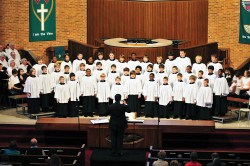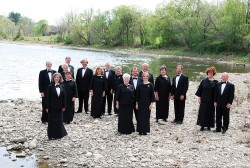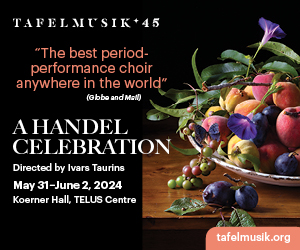Last issue I explored some of the reasons that people join choirs, focusing on such things as improving musical skills and singing great choral works. For many, the community aspect of group singing is of equal importance to music. If one is looking for a pastime, hobby, diversion, or social activity, group singing can fulfill all these needs.
But one can also see choral singing as a metaphor for the kind of cooperation that is necessary to make the world function. Each (vocal) part fulfills its particular role, according to its nature and ability. Some aspects of the group are more noticeable than others – altos tend to get buried in the mix – but each part is crucial to making up the whole, and the good quality of the choir is dependent on each section being able to make a healthy, secure and blended sound.
Still, music making is not an inherently democratic activity. The choir-as-society metaphor becomes more problematic when it is applied to the conductor, whose role is most regularly that of a benevolent dictator. But the conductor’s rule often only applies to the music making alone, while the larger power structure of the choir organization usually resides in a volunteer board of directors.
A dictatorial or abusive conductor may be tolerated for a time if they are getting an exceptional sound from the choir, but ultimately choral singers prefer to be treated well when making music, and know that musical excellence and courtesy in rehearsal are not mutually exclusive.
Any arts group has to negotiate the tension between focusing on the fun of the performance and maintaining a healthy culture of regular rehearsal. This mirrors the societal tug-of-war between rewarding achievement (tax breaks, incentives, high salaries) and looking after the mundane but necessary aspects of everyday life (roads, education, a social safety net).
 Many choirs use music to fundraise and to champion causes. Two fundraising concerts of interest take place this month. On June 11, the Chattanooga Boys Choir sings works by Purcell, Schubert, Bach and Rutter to raise funds to help with the maintenance of the Casavant organ at Our Lady of Sorrows Catholic Church. On June 16, the Coro San Marco – a local choir that specializes in Italian repertoire – is performing a concert of opera arias and choruses, in support of Japanese earthquake relief.
Many choirs use music to fundraise and to champion causes. Two fundraising concerts of interest take place this month. On June 11, the Chattanooga Boys Choir sings works by Purcell, Schubert, Bach and Rutter to raise funds to help with the maintenance of the Casavant organ at Our Lady of Sorrows Catholic Church. On June 16, the Coro San Marco – a local choir that specializes in Italian repertoire – is performing a concert of opera arias and choruses, in support of Japanese earthquake relief.
Composers themselves can also directly address social concerns through their compositions. Paul Winter’s Missa Gaia/Earth Mass has become a choral favourite since its premiere recording first appeared in 1982. It uses the Mass text only as a jumping off point for settings of other lyrics including poetry and hymns that take the health of the earth as their focus.
 The Karen Schuessler Singers were founded in 1993, and they work out of London. They have a strong reputation for crafting inventive seasons and commissioning new works. They have made their own performance tradition of the Missa Gaia, and have been performing it since 1994. This year’s performance, on June 4, will include displays by Salthaven Wildlife Rehabilitation and Education Centre. Salthaven’s focus is on the rescue and rehabilitation of sick, displaced, injured and orphaned wildlife. They also do local education and outreach to raise environmental awareness.
The Karen Schuessler Singers were founded in 1993, and they work out of London. They have a strong reputation for crafting inventive seasons and commissioning new works. They have made their own performance tradition of the Missa Gaia, and have been performing it since 1994. This year’s performance, on June 4, will include displays by Salthaven Wildlife Rehabilitation and Education Centre. Salthaven’s focus is on the rescue and rehabilitation of sick, displaced, injured and orphaned wildlife. They also do local education and outreach to raise environmental awareness.
Mozart’s Mass settings have become compositions for the ages, but at the time of their writing Mozart was as mired in politics as any working artisan. He wrote the majority of his mass settings in Salzburg, under the patronage of Archbishop Colloredo. Mozart was held to strict structural controls regarding both the style of music and length of composition that he was expected to produce. He disliked the autocratic style of the Archbishop, and wrote scathingly contemptuous letters to his father about the musicians for whom he was forced to write. For all that they were composed under arduous conditions, his Salzburg masses remain consistently popular. They are never less than professional, and all of them have moments of both inventiveness and insight. The Voices Choir performs Mozart’s 1779 “Coronation” Mass on June 25.
Politics is inherent in the traditional British Proms concert, in which ethnic pride is celebrated and satirized at the same time. No conductor does this better than Bramwell Tovey, who leads the TSO’s “Last Night of the Proms” with the Toronto Mendelssohn Choir, on June 21 and 22.
Some other events of interest during the summer months:
The excellent choir of the Church of St. Mary Magdalene has a Friday concert series on June 3, 10 and 17, featuring Mass settings by Victoria, Guerrero and Palestrina.
Further into the summer, the Elora Festival Singers perform several choral concerts each week of the the Elora Festival. Of particular interest is the July 21 performance of famed composer Arvo Pärt’s Passio, an intense setting of the Passion story. I can’t remember the last time (if ever) that this piece was performed in this area – this is a good opportunity to hear it live.
Finally, Choirs Ontario is a valuable resource that is perhaps less known to choral audiences than it is to choral organizations. It both fosters and coordinates choral opportunities for young singers, and is an important resource for the province’s choirs. The organization’s website (www.choirsontario.org) is worth checking out for a number of workshops and choral camps taking place between June and August.
Ben Stein is a Toronto tenor and theorbist. He can be contacted at choralscene@thewholenote.com.



